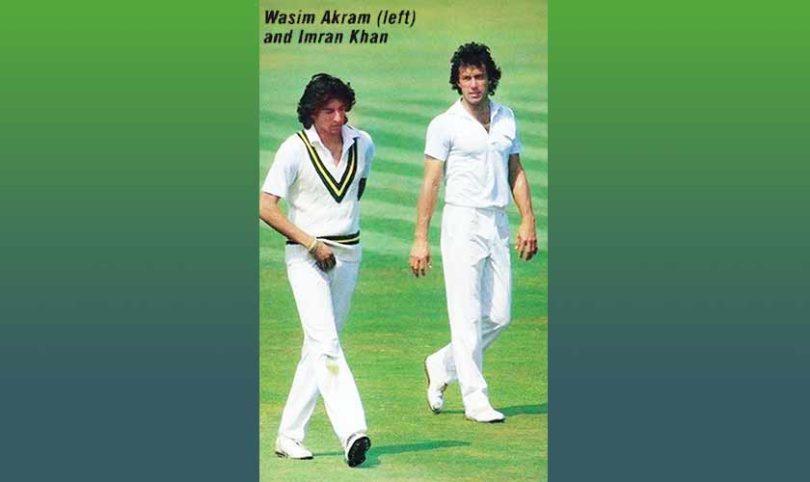Mushtaq Mohammad emerges as captain of the side because he was the first Pakistani skipper to change the mindset of his players, and that included a certain Imran Khan as well
Luck may favor the brave in real life but in cricket, it favors those who can both bat and bowl in any format of the game. And if that person is a good enough fielder (or a wicket-keeper), then he automatically qualifies for the all-rounders’ position.
Pakistan has produced some of the best all-rounders in the world, one of them being their current Prime Minister. However, since Test cricket in the country isn’t as old as in England, Australia and India, we decided to reduce the criteria of an all-rounder from completing a Test double (1000 runs and 100 wickets) to something easier. And that’s how we managed to find a list of players who fulfill our requirement of scoring at least 3 Test centuries, 25 wickets and holding on to more catches than they dropped (especially behind the stumps) in Tests. So here it goes!
Choosing the Openers
The current generation may not know but Majid Khan began his career as a useful medium-pacer in the mid-60s and opened the bowling with another debutant Asif Iqbal. It was only after he scored 80 runs in his third Test while batting at number seven that he was promoted first to number five and later to number three before becoming Pakistan’s number 1 batsman in both forms of the game. He didn’t quit bowling; he just became an off-spinner and managed to take 27 wickets during his career. However, it was his outstanding fielding that helped Pakistan take down many giants in the 70s and the 80s, and he ended up with a record 70 catches in 63 matches for his country, a national record that has been battered by Javed Miandad, Inzamam ul Haq, Asad Shafiq and Younis Khan. With 8 Test centuries to his name in 63 Tests and 3931 runs at an average of nearly 39, he is our first-choice opening batsman.
As his opening partner, we opt for Mudassar Nazar who was a fine opening batsman as well as a genuine all-rounder who was labeled ‘Man With The Golden Arm’ for his heroics with the ball. Not only did he once carry the bat in one Test innings (emulating his father Nazar Mohammad), he also holds the record of the slowest Test century (in terms of minutes) of all times. Add to that his 4114 runs at an average of 38, 10 Test centuries, 66 Wickets and 48 catches in 76 Tests) and you have the perfect Test opener for this team. Others like Aamer Sohail, Shahid Afridi and Mohammad Hafeez miss the bus for the top slot but while two of them will be accommodated elsewhere, left-handed Aamer Sohail will stay as reserve Test opener who could bat, bowl, and field on his day.
Reserves: Aamer Sohail (2823 runs at 35 with 5 centuries, 25 wickets at an average of 42 with 36 catches in 47 matches)
The Saviors in the middle!
If Mohammad Hafeez missed the bus as an opener, why not fit him at number three. After all, he has been there, done that in Test Cricket. No one can dump a national cricketer who has played 55 Tests, scored 3652 runs at an average of 38 with the help of 10 Test centuries, and has taken 53 wickets at 34, besides 45 catches, mostly in the slip region.
Legendary all-rounders Mushtaq Mohammad (3643 runs at 39 with 10 centuries, 79 wickets at an average of 29 with 42 catches in 57 matches), Asif Iqbal (3575 runs at 39 with 11 centuries, 53 wickets at an average of 28 with 36 catches in 58 matches), Wasim Raja (2821 runs at 36 with 4 centuries, 51 wickets at an average of 36 with 20 catches in 57 matches) and Imran Khan (3807 runs at 38 with 6 centuries, 362 wickets at an average of 23 with 28 catches in 88 matches) can fill the remaining spots in the middle-order.
Mushtaq Mohammad would also be named captain of the side because he was the first Pakistani skipper to change the mindset of his players, and that included a certain Imran Khan as well. With Mushy coming at number 4, Asif Iqbal at number five, Wasim Raja at six and Imran Khan at number seven, it will be a difficult middle-order to dismiss. The only person to miss the spot here would be Shoaib Malik because with Mohammad Hafeez in the line-up, there is no need for another middle-order batsman who could bowl off-spin.
Reserves: Shoaib Malik (1898 runs at 35 with 3 centuries, 32 wickets at an average of 48 with 18 catches in 35 matches)
Going for the best wicket-keeper!
While Moin Khan may be the most feared wicket-keeper batsman Pakistan has ever produced, and Kamran Akmal the most successful in terms of Test centuries, Sarfraz Ahmed (2657 runs at 36 with 3 centuries, 146 Catches and 21 stumpings in 49 matches) would be ideal for this team for many reasons. First of all, he is the safest custodian of the wicket amongst the three. He also has the best batting average. He didn’t improve drastically over the years like Moin Khan did, nor did he make dropping catches a habit like Kamran Akmal. The reason he is here is that you don’t need a suspect wicket-keeper behind the stumps with Imran Khan, Wasim Akram, and Abdur Razzaq sharing the new ball, or Mushtaq Mohammad or Wasim Raja deceiving the batsmen with their googlies. Moin Khan can be there as the second-best and would be good enough to play as a batsman alone, just like he did in a few matches alongside Rashid Latif, who fails to qualify because he missed the batting criteria. Otherwise, he remains the best wicket-keeper to play for Pakistan, alongside Wasim Bari.
Reserve: Moin Khan (2741 runs at 29 with 4 centuries, 128 Catches and 20 stumpings in 69 matches)
Unleash the best bowlers!
And finally, there are the bowlers – the ones who can bat, not the other way round as has been the case so far. With Imran Khan already picked up as the bowling spearhead, who else could match him at the other end but Wasim Akram (2898 runs at 23 with 3 centuries, 414 wickets at an average of 24 with 44 catches in 104 matches). After all, he was the perfect all-rounder during the 1990s with a huge double century besides two more centuries, not one but two Test hat-tricks and some stunning catches to his name.
He remains the most feared bowler in any format and would open the bowling for the side with his mentor, and prodigy Abdur Razzaq (1946 runs at 29 with 3 centuries, 100 wickets at an average of 37 with 15 catches in 46 matches) as the first-change bowler. Abdur Razzaq grabbed a hat-trick as well. Yes, he was not amongst the best fielders but with him bowling, it would be a safe field.
And then there was Shahid Afridi (1716 runs at 37 with 5 centuries, 48 wickets at an average of 36 with 10 catches in 27 matches) who could open the innings, bat in the lower order, and bamboozle the batsmen with his fast-paced leg-spin. He might not be required to bowl in the presence of Mushtaq Mohammad and Wasim Raja but they would be lucky to have a panther like Afridi in the field, who could take stunning catches when they were least expected. He could be adjusted anywhere in the batting line-up as per the situation and could replace Mudassar Nazar at the top, if the required run rate was high, or be sent in the middle-order to disturb the settled spinners.
His colleague Azhar Mahmood, however, couldn’t make it to the final XI because of Abdur Razzaq’s presence who was superior to him as a batsman and has more wickets to his name. Keeping Azhar Mahmood in the reserves doesn’t seem like a bad idea though!
Reserves: Azhar Mahmood (900 runs at 30 with 3 centuries, 39 wickets at an average of 36 with 14 catches in 21 matches)
Pakistan’s All-Rounders’ Test XI: Majid Khan, Mudassar Nazar, Mohammad Hafeez, Mushtaq Mohammad (captain), Asif Iqbal, Wasim Raja, Imran Khan, Sarfraz Ahmed (Wicket-keeper), Wasim Akram, Shahid Afridi, and Abdur Razzaq
Reserves: Aamer Sohail, Shoaib Malik, Moin Khan, Azhar Mahmood
Coach: Would this team need a coach?







